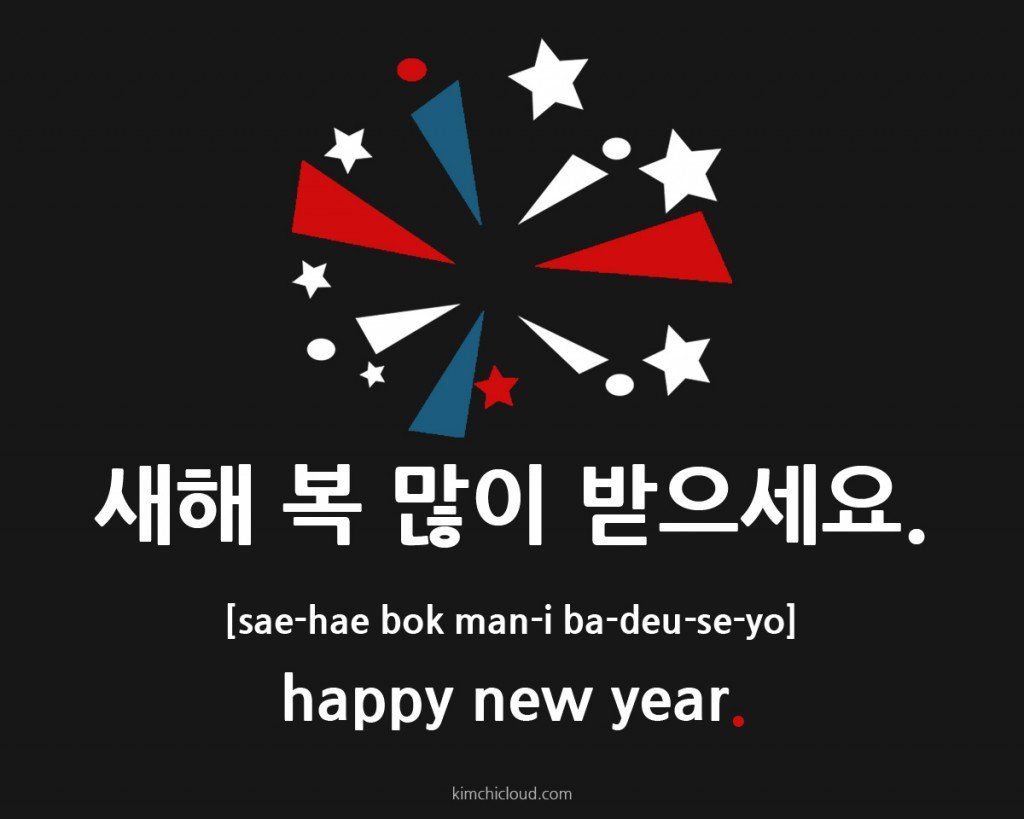새해 복 많이 받으세요 – How To Say Happy New Year in Korean
Happy New Year in Korean
Every year is a new year, and 00.00 January 1st every year, your phone probably explodes with messages from friends and family, wishing you a happy new year. This is the same for most cultures and countries, and Korea is no different. After reading this article, you will know all the ins and outs of how to say happy new year in Korean. So let’s cut to the chase. The phrase you will want to know is:
sae-hae bok man-i ba-deu-se-yo (polite)
In Hangul: 새해 복 많이 받으세요
If you just want the one phrase and not have to worry about offending someone, this is all you need to know. If you want to learn more Korean phrases like this, you we recommend you to take a look at our other Everyday Korean lessons. If you want a deeper understanding of this phrase however, please continue on reading!
So this was quite a long phrase, huh? Also, this does not translate literally to ‘happy new year’. So to make it more comprehensible, let’s break the phrase down, word by word.
- ‘sae-hae’ (새해) = new year (‘sae’, 새 = new. ‘hae’, 해 = year)
- ‘bok’ (복) = good luck / fortune
- ‘man-i’ (많이) = much/ a lot
- ba-deu-se-yo (받으세요) = please receive
So if you re-arrange the words to fit the English word order, you’ll get a sentence that looks something like this: “Please recieve a lot of luck this new year“. It sounds a bit awkward in English of course, but that’s how Koreans say it.
This is polite Korean and what you will want to use to everyone you’re not very close with and with people who are older than you. For example, you would say this to your:
- teacher
- boss
- grandparents
- older friends
- etc…
But what would you say to your friends? Pretty much the same thing, just a different ending. Let’s take a look!
sae-hae bok man-i ba-da (informal)
In Hangul: 새해 복 많이 받아
So these are the same words as before, but the ‘ba-deu-se-yo'(받으세요) has been changed to ‘bad-a’ (받아). This makes it suitable to use with your friends and people close to you. More specifically, you can use this with:
- close friends
- siblings
- people who are clearly younger than you
- your parents (traditionally you wouldn’t but nowadays most Koreans do)
While this is by far the most common expression you will use and hear, there are also other phrases you can use if you want. For example, you can say:
sae-hae-e-do geon-gang-ha-se-yo (polite)
In Hangul: 새해에도 건강하세요
‘geon-gang-ha-se-yo’ (건강하세요) means ‘Please be healthy’, so this phrase simply translates to ‘Please stay healthy this coming year too‘.
Or you can say:
haeng-bok-han sae-hae dwe-se-you (polite)
In Hangul: 행복한 새해 되세요
Which means something along the lines of ‘Have a happy new year‘. This of course resembles the English phrase more closely than the first phrase we learned, but note that it is not nearly as common as that one.
Korea celebrates two new years
As you might already be familiar with, Korea follows two calendars, the solar (western) calendar and the lunar (Chinese) calendar. As such, there are also two new years to celebrate, ‘sin-jeong’ (신정) and ‘gu-jeong’ (구정). ‘gu-jeong’ (구정), new year by the lunar calendar, is arguably the largest holiday of the year. So even though Korea officially uses the solar calendar, the western new year , ‘sin-jeong’ (신정) aka Jan 1st, is not as big as the lunar one. However, the phrases we learned above are still used on both of these occasions. The date for the Lunar calendar is different every year, but new year is usually occurs in February.
This is pretty much all you need to know about how to wish someone a happy new year in Korean. For more lessons like this, please check out our Everyday Korean Archive. If you found this lesson useful, please like or share! If you have any questions, let us know in the comments below and we will do our best to help you out.
By: Kimchi Cloud





